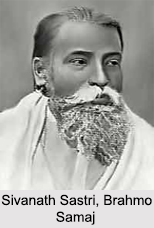 Sivanath Sastri (1847-1919) was born in the house of his maternal uncle at Chingripota village. His family was Vedic Brahmin. Initially he started attending the local pathsala. Thereafter he attended an English school at Majilpur. He was influenced by Brahmo Samaj. At the age of nine he joined Sanskrit Collegiate School.
Sivanath Sastri (1847-1919) was born in the house of his maternal uncle at Chingripota village. His family was Vedic Brahmin. Initially he started attending the local pathsala. Thereafter he attended an English school at Majilpur. He was influenced by Brahmo Samaj. At the age of nine he joined Sanskrit Collegiate School.
He attended lectures of Debendranath Tagore, Keshab Chandra Sen and Ajodhyanath Pakrashi in the Bhowanipur as early as 1862. This movement affected his native village. Brahmos opened a girls` school in the village and his mother admitted his sisters in the school. While his family supported the Brahmo Samaj, they had not joined it. Sivanath Sastri had his friends who joined Brahmo Samaj. They include Aghore Nath Gupta and Vijay Krishna Goswami. He was also influenced by Umesh Chandra Mukhopadhyay. He attended prayers of the Brahmo Samaj. Keshab Chandra Sen initiated him into the Brahmo Samaj in the year 1869. He discarded his sacred thread.
Sivanath Sastri completed B.A. and M.A. in Sanskrit from the University of Calcutta and was given the title of `Sastri`. People such as Ramtanu Lahiri and Dwarkanath Ganguly had a great impact on his life. Sivanath Sastri had a cordial relationship with Ramakrishna Paramahansa whom he had met at Dakshineswar in 1875. He had written about him in the popular English magazine `Modern Review`. Even Ramakrishna Paramahamsadev attended a Brahmo festival at Sinthee. Sivanath Sastri was married to Prasannamoyee when he was of the age of 12 or 13. She was unhappy with the marriage. He was married a second time to Birajmohini. He was against the second marriage. He was shocked with the happenings in his life that pushed him further towards the Brahmo Samaj. He was a strong disciplinarian. He breathed his last on 30 September 1919.
Formation of Sadharan Brahmo Samaj
Minor clashes grew within the Brahmo Samaj regarding some views and activities of Keshab Chandra Sen. When his daughter was married to the Maharaja of Cooch Behar, the Brahmo Samaj was split into two. A bitter struggle followed and Sivanath Sastri was one of the leaders who opposed Keshab Chandra Sen. They were known as the Samadarshi group and the Sadharan Brahmo Samaj was formed in 1878. A small group of five people - Sivanath Sastri, Kedarnath Roy, Nagendranath Chaterjee, Kalinath Dutta, and Umesh Chandra Dutta were engaged in religious discussions and they were known as `Panchapradip`
The Indian Association was set up in 1876 with Ananda Mohan Bose as its president and Surendranath Banerjee as its secretary. Sivanath Sastri was a committee member. He held prayer meetings and lectures. In 1879, he set out on a journey taking him past Bankipore and Agra to Lahore. On his way he met several important personalities. In 1881 he went on a tour to South India.
Literary works of Sivanath Sastri
His works are - History of the Brahmo Samaj, New Dispensation and the Sadharan Brahmo Samaj, Men I Have Seen, The Mission of the Brahmo Samaj, Theistic Churches in India, Puspamalya(poem), Mejo Bou (novel), Jatived, Pushpanjali (poem), Nirbasiter Bilap (poem), Pushpamala (poem), Himadrikusum (poem), Chhayamoyee Parinay, Jugantar (novel), Nayantara (novel), Upakatha, Bidhabar Chhele,Raghubansa , Dharmajibon, Ramtanu Lahiri O Tatkalin Bangasamaj, Atmacharit, Atmapariksha, Englander Diary, and Chhotoder Galpo.
He also started a Bengali periodical, Mukul, for children in the year 1302. He was the editor for six years. Sramajibi was his poem that was published in the inaugural issue of Bharat Sramajibi.



















